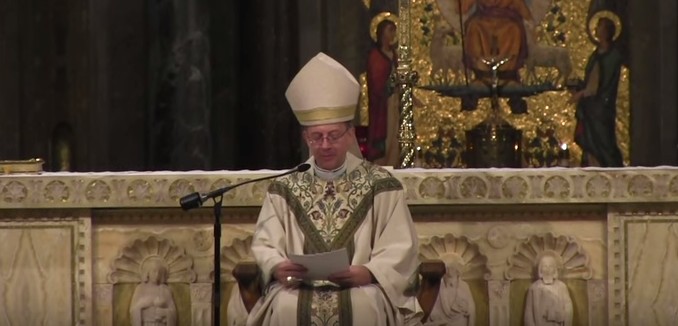This week, Washington, D.C. will bear witness to an ideological fusion of Christian anti-Semitism (repudiated by the Vatican a half-century ago) and Palestinian nationalism when the Holy Land Christian Ecumenical Foundation (HCEF) holds its annual international conference. One could say many things about the conference, but based on the speakers, it will be anything but holy. Most unfortunate will be the presence at the conference of the Archdiocese of Washington though its Auxiliary Bishop, the Most Reverend Barry C. Knestout, a scheduled speaker. His appearance will be perceived as an official endorsement for HCEF and its agenda.
The “Palestinization” of Christian theology has gained a degree of popularity in some Christian circles. It is traceable to what its proponents call “Palestinian Liberation Theology,” created by Christian Palestinian nationalists for deployment in the political war against Jewish national sovereignty. We saw an example of this last week on Washington’s National Mall, when Rev. Jeremiah Wright continued the long and shameful history of de-Judaizing Jesus when he declared that “Jesus was a Palestinian.” The Church Fathers did it, as did German Protestant theologians who “Aryanized” Jesus during the Third Reich.
Judging by HCEF’s website, and the record of upcoming and past conference speakers, similar anti-Jewish themes will likely be present at this year’s convention.
Palestinian liberation theology was created by Palestinian Christian Rev. Naim Ateek, founder of the Sabeel Ecumenical Liberation Theology Center. His doctrine is the vehicle that is driving the spread of the Palestinian nationalist agenda within churches worldwide. The HCEF website is filled with Ateek’s and Sabeel’s statements.
Ateek has made numerous anti-Semitic comments over the years, which HCEF defends. One of Ateek’s most infamous statements, found on HCEF’s website, is this: “Jesus is on the cross again with thousands of crucified Palestinians around him” put there by “the Israeli government crucifixion system.” This imagery of deicide presses on still unhealed wounds in the history of the Jewish people’s encounter with Christianity.
Ateek also preaches replacement theology, including stripping Jesus of his Jewish identity and turning him into a Palestinian. “Palestinian liberation theology,” he wrote, “focuses on the humanity of Jesus of Nazareth, who was also a Palestinian living under an occupation.” Ateek’s other overtly anti-Semitic comments include the repeated disparagement of Judaism as “tribal,” “primitive,” and “exclusionary.” He has said that “the establishment of Israel was a relapse to the most primitive concepts of an exclusive, tribal God” and that at the “heart of the Torah… which is the most authoritative part of the Hebrew Scriptures for Jews” is ethnic cleansing and mass murder.
Speaking at two of this year’s conference’s workshops is Mazin Qumseyeh, another Christian Palestinian activist, whose large repertoire of writings is replete with overtly anti-Semitic themes. He has written about the “Zionist controlled mainstream media” and has claimed that Israeli Jews “have developed fear of gentiles to paranoia levels” and that Israeli children “going to school are beaten by someone who believes that the blood of Jews is redder than Goyims [sic].” He engages in Holocaust denial, claiming that “in ‘democratic’ Europe there are countries were you can examine and challenge any historical event except the Zionist version of WWII history.” He has used racialist theories to deny Jewish historical and religious connections with the Land of Israel, claiming that “most Ashkenazis are convert [sic] Khazar’s [sic] with closer ties to Turkish people than to Semitic people.” This theory has been thoroughly debunked, yet Qumseyeh seems not to have noticed that it is the mirror image of Nazi racism, which claimed that Jews were too “Semitic” to be allowed to live in Europe (or anywhere else).
At last year’s conference, Palestinian spokesperson Hanan Ashrawi referred to “the methodology of Israel’s genocide and ethnic cleansing of not only Christian Palestinians but all non-Jews.”
Mark Braverman, Executive Director of Kairos USA, spoke at HCEF’s 2009 conference. He has compared the Nazi Holocaust to the State of Israel, called Zionism “a threat to Jewish identity,” has criticized “the exploitation of Christian feelings of complicity in and guilt for the Holocaust to promote Zionism” and called upon Jews “to get over the exceptionalism, isolationism and the paranoia and the sense of being special and apart.” The Kairos Palestine Document, which Braverman’s group promotes, supports anti-Israel BDS campaigns, denies Jewish historical connections to the land of Israel, and whitewashes Islamist terrorism against Israelis.
This bigoted tone and substance is likely to be encountered by Auxiliary Bishop Knestout of the Archdiocese of Washington when he attends the HCEF conference. His presence would contradict and undermine the message and spirit of the Second Vatican Council, which 50 years ago repudiated centuries of Christian anti-Semitic teachings. Remaining on the program would give sanction to the HCEF and its history of condoning anti-Semitism. It is not too late for the Archdiocese to disengage from this HCEF conference and thereby send a clear and much needed repudiation of anti-Semitism.
[Photo: Divine Mercy / YouTube ]




